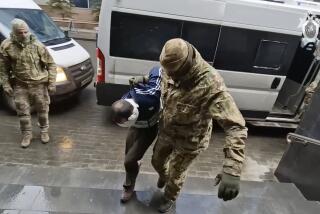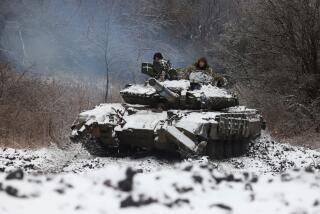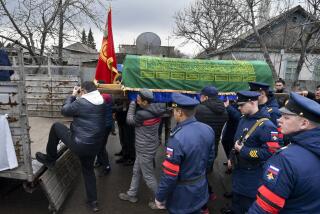In Chechnya, Old Enemies Battle New Tricks That Threaten Peace
- Share via
NAUR, Russia — Liza A. Mikhailenko was astonished to hear that she had been raped and murdered, along with her teenage daughter, in a fierce outbreak of racial hatred carried out by Chechens against their Russian Cossack neighbors.
The truth? No one had laid a finger on either woman, the Russian agronomist said, standing under a withered vine at the collective farm in Chechnya where she has worked all her adult life.
“As you can see, I’m alive and well,” she said, half-laughing, half-anxious, reassuringly patting the Chechen police officer--an old schoolmate and friend--who had brought the news of her “death.”
For Russians and Chechens who live together in northern Chechnya, there is nothing reassuring about the stream of exaggerated reports in the Russian media of anti-Russian violence now that Moscow has lost its war to crush Chechens’ dream of independence.
They are terrified that war-minded groups in Moscow are deliberately stirring up tension between Russians and Chechens as a pretext for new Russian military intervention.
“There are third forces at work here, and they’re cooking up these dirty tricks whose consequences are too scary to even think about,” Mikhailenko said. “It’s true that things are hard here, especially for us Russians. But I think it’s completely wrong to make up fake lists and stir things up by writing down things that are untrue.”
Mikhailenko’s name was on a list of 23 Russians allegedly slain in Chechnya who are all still alive.
The list caused such outrage in Russia that it threatened to disrupt the Jan. 27 presidential election in Chechnya, destroy a peace deal with Russia and send Russian troops marching back into Chechnya to protect their ethnic kin.
The list revived latent animosity between the Russians of the south, descendants of Cossack farmer-warriors who fought a decades-long war last century to bring the Muslim-populated mountains into the Russian empire, and the Muslim Chechens who resisted them under the legendary Imam Shamil.
The allegations surfaced just a few days after the Chechen election campaign began, as it became clear that there were no pro-Russian presidential candidates and that Russia’s chief object of hate, the passionately anti-Moscow rebel commander Shamil Basayev, was a leading contender.
Basayev, named after the 19th century Shamil, is viewed as a terrorist in Russia and as a hero by Chechens for leading a 1995 raid into Russia. He emerged as the strongest challenger to Moscow’s preferred candidate, moderate Aslan Maskhadov.
*
Moderate Chechen and Russian politicians believe the list was fabricated--probably by the Russian Federal Security Service, a successor to the Soviet KGB--to convince voters that a Basayev victory would bring back the war that ravaged the south.
These fears are not as paranoid as they sound to Western ears. The most recent war in Chechnya, which began in December 1994, was preceded by increasingly aggressive disinformation, leaked from secret service sources in Moscow. In Chechnya, any rerun of these mind games is seen as a sign that Moscow is still ready to fight them.
“These crimes suit the book of someone in Moscow, and I think you know whose as well as I do,” said Vladimir A. Kashlyunov, Cossack boss of northern Chechnya’s Naur district. “There were a lot of these inexplicable occurrences before the war, and now there’s a new spurt of them since the war ended.
“We Russians who live inside Chechnya want to go on being at peace with our neighbors. The most important thing now is not to turn the clock back. That’s dangerous, especially when you remember that our history is one of war and violence,” he added.
If provoking more conflict was the aim of the mysterious list, whose origins are being investigated by southern Russian authorities, it only partially succeeded. The election went ahead despite the furor. Maskhadov beat Basayev and the others, winning by a majority. The peace held.
But the Russian-inhabited districts of northern Chechnya are places of fear and suspicion. Russians and Chechens scuttle past each other in village squares, with their eyes lowered.
Real ethnic crimes have begun to replace imaginary ones. Youths from each ethnic group threaten “betrayers” from the other with fists and grenades. A 55-year-old Russian in Naur recently tossed a grenade into a police car, seriously injuring two Chechen police officers.
*
The rise and fall of the original “provocation,” the list of imaginary murders on which Mikhailenko figured, has left the Russian-populated north of Chechnya a fertile breeding ground for genuine new race conflicts.
The list was first circulated at a Jan. 5 meeting of Cossacks in Stavropol Territory, the farming zone outside Chechnya. It fit so well with Russian preconceptions of Chechen savagery that its provenance and veracity weren’t questioned.
The list provoked an emotional war cry, full of the historical resonance of last century’s Cossack battles against the original Shamil. Cossacks “have become hostages to the genocide of the Russian people in the Caucasus mountains,” delegates said.
The irate Cossacks demanded that the two northern Chechen districts where most Russians live--Naur and Shelkovsky--be split off from Chechnya and administered from Stavropol, as they were until the 1950s. They wanted the Cossacks to be allowed to carry weapons to protect themselves.
Modern Cossack organizations are widely regarded by ordinary Russians as something of a joke. Drawn largely from the ranks of the unemployed, members are registered in Soviet-style “social organizations” made up of tough youths. They know almost nothing about their history but have a hankering for a romantic past of fighting Muslims.
The Cossacks’ attempts at reviving themselves as a fighting force have, until now, not been taken very seriously, although President Boris N. Yeltsin flirted briefly in 1993 with the idea of letting Cossack militias police their traditional southern stomping grounds.
But, suddenly, the Cossacks’ war cries got unexpected backing from a very high Russian politician: Moscow’s latest envoy to Chechnya, Boris Berezovsky, who dropped his peaceable attitude toward the Chechens.
“When you say, ‘Give us arms, because the Chechens have arms,’ I can tell you I support you 100%,” Berezovsky told an angry roomful of Cossacks who were dressed in improvised historical uniforms and carried traditional swords.
Hard-line Russian Interior Minister Anatoly S. Kulikov upped the ante, saying Cossacks should not meddle but that real Russian troops should reenter Chechnya and “protect people” if genocide against Russians erupted there.
With tensions running at fever pitch, Chechnya’s Maskhadov stepped in days before the election to “stop the forces of evil involving Cossacks in confrontation.”
He called an emergency meeting between the Cossack leaders and police chiefs of Stavropol and the local Cossack and Chechen law-and-order bosses of northern Chechnya.
As soon as the two sides met, what had looked like an impending tragedy turned into farce, said Nurdi Eldarov, police chief of Naur district.
“The Russians said we were riding roughshod over the law and gave us this list of 23 crimes, probably compiled by the KGB. When I looked at the list, I was quite astonished: It was full of my neighbors’ names, people I had seen only that morning, people who have never been attacked by anyone,” he said.
“I told them they should be riding roughshod over whoever compiled that list, because I could put all those alleged victims in a bus and send them to Stavropol Territory right now. The Stavropol authorities published a public apology in the newspaper, saying it was all a mistake.”
Maskhadov said he was relieved that a crisis had been averted. But the tension in northern Chechnya has not dissipated. Kashlyunov, Naur’s Cossack chief, said he is fearful for the future.
“There will be a continuation of this story, and we will have to try to contain it,” he said somberly.
More to Read
Sign up for Essential California
The most important California stories and recommendations in your inbox every morning.
You may occasionally receive promotional content from the Los Angeles Times.










